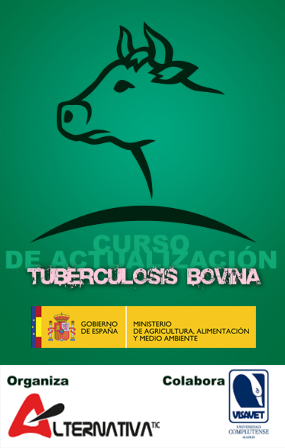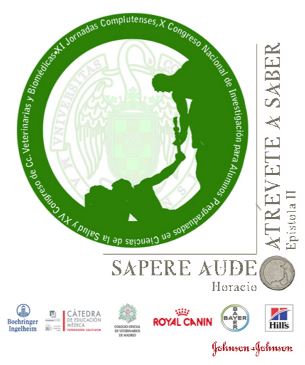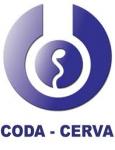April, 2016 news
April 28th, 2016
Via publiDB
Seminars VISAVET 2016
Communications in this event:
- Lesiones más importantes en el matadero de aves
- Emerging Zoonoses versus Neglected zoonoses
- Acceso del personal en laboratorios de alta seguridad biolĂłgica
- Diez preguntas y respuestas sobre el virus Zika
- Bovine tuberculosis in Norway
- Uptake of antimicrobial resistance genes in Campylobacter
- Transporte de substancias infecciosas. ClasificaciĂłn y embalaje. Cadena de seguridad biolĂłgica
April 27th, 2016
Via publiDB

Nuevos estudios cientĂficos 2013-2015 en materia de diagnĂłstico y control de tuberculosis. Perspectivas de futuro
Conference in Curso de actualizaciĂłn tuberculosis bovina
April 27th, 2016
Via publiDB
La RE-LAB
Oral communication in VII Curso de Riesgos NBQ para personal de las FAS y FCSE
April 21st, 2021
Via publiDB

XI Jornadas Complutenses. X Congreso Nacional Investigación Alumnos Pregraduados en Ciencias de la Salud. XV Congreso de Ciencias Veterinarias y Biomédicas
Communications in this event:
- EpidemiologĂa, control y aspectos clĂnicos de la brucelosis en rumiantes
- AplicaciĂłn de la termografĂa en la detecciĂłn de lesiones cutáneas en mamĂferos marinos
- Problemática de la peste porcina africana en Europa. Alternativas futuras
- ¿Por qué seguimos sin vacuna para la peste porcina africana?
- Sistemas de identificaciĂłn de micobacterias no tuberculosas
- Objetivo 2050: erradicaciĂłn de la tuberculosis
- Programa de erradicación de brucelosis bovina en España
- Descripción anatomopatológica de una caso de fallo hepático severo en équidos
April 21st, 2016
Via publiDB

EstandarizaciĂłn en el laboratorio del kit de IDVET para la detecciĂłn de interferĂłn gamma
Conference in FormaciĂłn en DiagnĂłstico Laboratorial de Micobacteriosis
April 21st, 2016
Via publiDB

Salud Intestinal y AlimentaciĂłn NutraceĂştica
Conference in AlimentaciĂłn nutraceĂştica en Acuicultura
Related news in other media:
- DIBAQ 4TRESS: Un nutracéutico capaz de trasladar las mejoras en la salud del pez a una mayor calidad y durabilidad del producto final - mispeces.com
April 19th, 2016
Via publiDB

Epidemiology of C. burnetii in sheep in a Spanish region: seroprevalence, spatial distribution and risk factors
Oral communication in Symposium Current findings in Q fever
April 16th, 2016
Via publiDB

Seroprevalence and factors associated with equine herpesvirus type 1 and 4 in Spanish Purebred horses in Spain
The Veterinary Record publish this investigation article
Equine herpesvirus type 1 (EHV-1) and type 4 (EHV-4) have a worldwide distribution and cause respiratory disease, abortion, neonatal death and myeloencephalopathy in susceptible horses. Given the scarcity of serological EHV-1/EHV-4 data in Spain, the objective of this cross-sectional study was to estimate the seroprevalence of EHV-1/EHV-4 and to identify potential horse-level and stud farm-level factors associated with EHV-1/EHV-4 in the breeding Spanish Purebred (SP) horse population in central Spain. Serum samples from 334 SP unvaccinated horses, collected between September 2011 and November…
Read more
April 16th, 2016
Via publiDB
Tuberculosis y ganado de lidia: el reto constante
Oral communication in XXIV Jornadas TĂ©cnicas de A.V.E.T. "El veterinario en la cultura de la tauromaquia"
April 15th, 2016
Via publiDB
Salmonella Typhimurium infection primes a nutriprive mechanism in piglets
Investigation article published in Veterinary Microbiology
Salmonella enterica serovar Typhimurium (S. Typhimurium) is an important cause of acute food- borne zoonoses worldwide, typically carried by pigs. It is well known that Salmonella has evolved a wide array of strategies enabling it to invade the host, but little information is available on the specific host responses to Salmonella infections. In the present study, we used an in vivo approach (involving piglets infected with a virulent or an attenuated S. Typhimurium strain) coupled to histological and proteomic analysis of the cecum mucosa, to highlight the host pathways activated during S. Typ…
Read more
April 14th, 2016
Via publiDB

Salud Intestinal y AlimentaciĂłn NutraceĂştica
Oral communication in AlimentaciĂłn nutraceĂştica en Acuicultura
Related news in other media:
- Dibaq lanza DIBAQ 4TRESS®, una nueva lĂnea de alimentos nutracĂ©uticos - ipac.acuicultura
- Sale al mercado la nueva lĂnea de alimentos Dibaq 4TRESS para mejorar la salud y el rendimiento productivo - mispeces.com
April 13rd, 2016
Via publiDB

Puntos clave para un diagnĂłstico laboratorial efectivo ante una sospecha de patologĂa infecciosa en Ă©quidos
Conference in Jornada Complutense de ClĂnica Equina: AproximaciĂłn laboratorial a la clĂnica de campo
April 10th, 2016
Via publiDB
Variabilidad de polen y estado sanitario de las colmenas
Poster presented in IV congreso Ibérico de Apicultura
April 8th, 2016
Via publiDB

Especialista en Animales ExĂłticos y Salvajes: Manejo, ClĂnica y CrĂa en Cautividad
Communications in this event:
April 7th, 2016
Via publiDB
Shiga toxin-producing Escherichia coli outbreak in Romania and Italy
New post in Blog Madri+d de Seguridad Alimentaria y AlimentaciĂłn
April 7th, 2016
Via publiDB
EURL Training Mobility. VI edition
Communications in this event:
- Molecular characterisation of the species of the M. tuberculosis complex
- Bacteriological culture and idenfication of mycobacteria
- Diagnosis of tuberculosis by immunogical methods: skin test, and interferon gamma assay and serology
- Biosafety in the mycobacteria laboratory
April 2nd, 2016
Via publiDB
Jornadas Técnicas de la Asociación Madrileña de Veterinarios del Toro de Lidia
Communications in this event:
April 1st, 2016
Via publiDB
Oral administration of heat-inactivated Mycobacterium bovis reduces the response of farmed red deer to avian and bovine tuberculin
Veterinary Immunology and Immunopathology publish this investigation article
Orally delivered mycobacterial antigens may not sensitize the immunized animals causing a positive tuberculin skin test response. As the first step to address this critical issue, we characterized the response of farmed red deer (Cervus elaphus) to orally delivered heat-inactivated Mycobacterium bovis. Thirty-two adult red deer hinds from a farm known to be free of tuberculosis (TB) were randomly assigned to two different treatment groups, immunized (n = 24) and control (n = 8). Immunized hinds were dosed orally with 2 ml of PBS containing 6 Ă— 106 heat-inactivated M. bovis. The mean skin test…
Read more
April 1st, 2016
Via publiDB
Detection of Leishmania-specific DNA and surface antigens using a combination of functionalized magnetic beads and cadmium selenite quantum dots
Investigation article published in Journal of microbiological methods
Leishmaniosis is a zoonotic disease that affects millions of people especially in resource-poor settings. The development of reliable diagnostic assays that do not require dedicated equipment or highly trained personnel would improve early diagnosis and effective control. For this purpose, a combination of magnetic bead and cadmium selenite quantum dot probes was applied for the detection of Leishmania-specific surface antigens (proteins) and DNA. Both analytes are isolated from the solution using magnetic bead capture probes whereas the presence of the targeted molecules is demonstrated by qu…
Read more
April 1st, 2016
Via publiDB
Implementation and validation of an economic module in the Be-FAST model to predict costs generated by livestock disease epidemics: Application to classical swine fever epidemics in Spain
Investigation published in Preventive Veterinary Medicine
Be-FAST is a computer program based on a time-spatial stochastic spread mathematical model for studying the transmission of infectious livestock diseases within and between farms. The present work describes a new module integrated into Be-FAST to model the economic consequences of the spreading of classical swine fever (CSF) and other infectious livestock diseases within and between farms. CSF is financially one of the most damaging diseases in the swine industry worldwide. Specifically in Spain, the economic costs in the two last CSF epidemics (1997 and 2001) reached jointly more than 108 mil…
Read more
April 1st, 2016
Via publiDB

Detection of plasmid mediated colistin resistance (MCR-1) in Escherichia coli and Salmonella enterica isolated from poultry and swine in Spain
Investigation published in Research in Veterinary Science
Recent findings suggest that use of colistin as a last resort antibiotic is seriously threatened by the rise of a new plasmid mediated mechanism of resistance (MCR-1). This work identifies, by the first time in Southern Europe, the gene mcr-1 in 9 enterobacteria from farm animals (poultry and swine), being of particular relevance its finding in 4 Salmonella enterica, 3 belonging to serovar Typhimurium and 1 to Rissen. MCR-1 was found encoded by a plasmid highly mobilizable by conjugation to the E. coli J53 strain…
Read more
April 1st, 2016
Via publiDB
Thirty-Five-Year Presence of African Swine Fever in Sardinia: History, Evolution and Risk Factors for Disease Maintenance
Transboundary and Emerging Diseases publish this investigation article
Despite the implementation of control efforts and funds to fight against the disease, African swine fever (ASF) has been present in Sardinia since 1978. It has caused serious problems for both the industrial pig sector and the regional authorities in Sardinia, as well as the economy of Italy and the European Union, which annually supports the costly eradication programme. During this time, ASF has persisted, especially in the central-east part of Sardinia where almost 75% of the total outbreaks are concentrated. The Sardinian pig sector is clearly divided into two categories based on the
spec…
Read more
April 1st, 2016
Via publiDB
Natural immunity of sheep and lambs against the Schmallenberg virus infection
Investigation article published in Transboundary and Emerging Diseases
Since the first reports of the Schmallenberg disease (SBD) outbreaks in late 2011, the disease has spread across Europe, affecting cattle and sheep farms. While Schmallenberg virus (SBV) causes a mild clinical disease in adults, infection of pregnant females may lead to the production of typical congenital malformations (CMFs) in their offspring. It is speculated that the immunity acquired after a SBV infection is effective in preventing further infections. However, this has not been proven in naturally infected sheep, especially if they are pregnant when reinfected. The aim of this study was…
Read more
April 1st, 2016
Via publiDB

Repercusiones en la salud pĂşblica de las resistencias a antibioticos en la produccion animal
New article published in Albéitar
Además de los criterios clĂnicos y terapĂ©uticos, de la facilidad de uso o el precio asociados al acto de prescripciĂłn, en el caso especĂfico de los antibiĂłticos los veterinarios han de añadir las implicaciones en la salud pĂşblica, lo que supone un nuevo desafĂo profesional…
Read more
April 1st, 2016
Vía Eurocarnedigital
NANTA celebra un jornada para mejorar el uso responsable de antibiĂłticos en ganaderĂa
Antibiotics and resistance: a recurring challenge
Nanta, empresa dedicada a la alimentaciĂłn animal, ha celebrado en colaboraciĂłn con Elanco, compañĂa del sector de salud animal, su I Jornada TĂ©cnica centrada en un tema de rigurosa actualidad en el marco de la UniĂłn Europea, “el uso responsable de antibiĂłticos”.
“La finalidad de esta jornada ha sido concienciar a los especialistas de la importancia de disminuir el empleo de antibiĂłticos en piensos de cara a la inminente entrada en vigor del Reglamento del Parlamento Europeo y del Consejo relativo a la fabricaciĂłn, la comercializaciĂłn y el uso de piensos medicamentosos y el rel…
- Nombela pide a organismos internacionales controlen resistencia antibiĂłticos - elconfidencial.com


